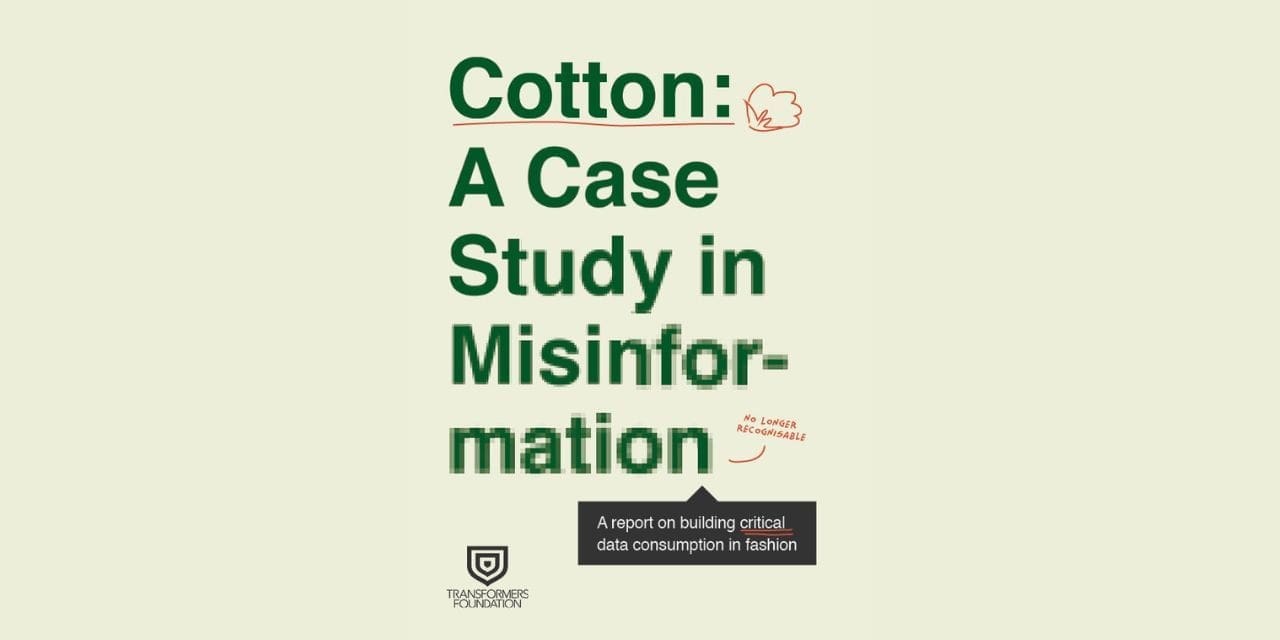New York, New York | October 7th, 2023 | – Transformers Foundation, a nonprofit organization committed to supporting a responsible denim industry, is pleased to announce the release of the update to their groundbreaking 2021 report, titled “Cotton: A Case Study in Misinformation.” This updated version incorporates the latest data from the International Cotton Advisory Committee (ICAC), Bayer Crop Science, and the Food and Agriculture Organization of the United Nations (FAO), with new data on fetilizers that was not previously covered, focusing on information relevant to the textile industry.
In 2021, the Transformers Foundation shed light on the fashion industry’s misinformation problem through their deep-dive report, “Cotton: A Case Study in Misinformation.” The report uncovered the spread of half-truths and context-free data that undermine responsibility and transparency efforts within the industry, ultimately eroding public trust and democratic institutions.
The 2021 report stressed the importance of critical data consumption, responsible sharing, and nuanced data interpretation. It emphasized the need to combat misinformation, rely on reliable and up-to-date sources, and foster open dialogue while addressing and correcting errors. Furthermore, the report called for the use of data to drive actionable change across sectors, avoiding the shifting of problems or demonizing others.
Expanding upon the findings of the 2021 report, the updated annex provides new data and analysis on key aspects of cotton production including pesticide use, water use and fertiliser use from ICAC’s Cotton Data Book 2022 (whereas our 2021 report covered data from 2019 and did not cover fertilisers). It aims to not only gather and share accurate information but also encourage the industry to rethink the way we source cotton.
By taking a more localized and nuanced approach to data collection and analysis, the report seeks to understand the complexity of resource use decisions farmers have to make and work together to support solutions that address their specific needs. This report explicitly lays out the need for brands and retailers to take the back seat and let the experts, the farmers, lead the solutions.
However, the data gaps presented in this paper reveal a much deeper, structural challenge—the issue of partnerships. The future of cotton isn’t only about what numbers state, but about understanding the individual farmers, the communities, and the unique challenges they face. It’s about recognizing that each statistic has a human story, a local challenge, and a partnership opportunity behind it.
“Our mission transcends data dissemination. It’s about redefining cotton sourcing, celebrating the role of individual farmers, and fostering genuine partnerships. We want stakeholders to form meaningful ties with their raw material providers, delving deeper into local realities beyond mere statistics. This is the key to championing the farmers who are tackling the pressing environmental and ethical challenges head-on,” expressed Ani Wells of the Transformers Foundation.
Download the full report and register for the launch webinar “Cotton Unspun: Data, Context, and the Future of Sourcing” here.
For further information, contact Ani Wells at communicatoins@transformersfoundation.org .
About Transformers Foundation:
Transformers Foundation is the unified voice representing the denim industry and its ideas for positive change. It was founded to provide a thus-far missing platform to the jeans and denim supply chain, and a central point of contact for consumers, brands, NGOs, and media who want to learn more about ethics and sustainable innovation in the industry.
We represent the denim supply chain: from farmers and chemical suppliers to denim mills and jeans factories.
Transformers Cotton Paper_Embargo_20230921_TransformersFoundation

